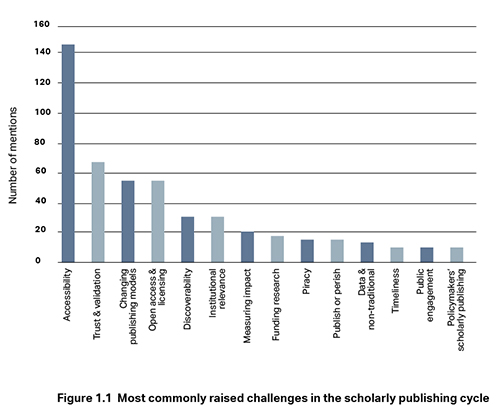1. Contents, Executive Summary and Highlights
Contents
1. Executive Summary & Highlights
5. Findings: Producing Research
6. Findings: Publishing Research
7. Findings: Providing Access to Research
List of interviewees
Librarians
Dr Danny Kingsley, Deputy Director, Scholarly Communication and Research Services, Cambridge University Library
Prof Lisa Janicke Hinchliffe, Professor/Coordinator for Information Literacy Services and Instruction, University Library, University of Illinois at Urbana-Champaign
Simon Bains, Head of Research Services and Deputy Librarian, The University of Manchester Library
Elaine L. Westbrooks, Vice Provost of University Libraries & University Librarian, University of North Carolina at Chapel Hill
Publishers
Clare Hooper, Head of Journals, Liverpool University Press
Jean Roberts, Business Development Director UK/Europe, Glasstree Academic Publishing
Gemma Hersh, Vice President Open Science, Elsevier
Sara Uhac, Managing Director, InTech
Researchers
Prof Stephen Curry, Professor of Structural Biology, Imperial College London
Dr Corina Logan, Leverhulme Early Career Research Fellow University of Cambridge, and co-lead on the Bullied into Bad Science campaign
Prof Charles Oppenheim, Former Head of Department of Information Science at Loughborough University
Prof Martin Eve, Professor of Literature, Technology and Publishing, Birkbeck, University of London
1 Executive summary and highlights
1.1 Overview
This report details the results of a questionnaire and series of interviews into the challenges facing the scholarly publishing cycle.
As well as highlighting the importance of specific issues (most notably accessibility, trust and validation, changing publishing models, open access and licensing), it also shows an increasingly failing system with a lack of goodwill between the different sectors: researchers are not getting (legal) access to the resources they need, publishers are being vilified (rightly or wrongly), and libraries are feeling increasingly powerless to provide the services their users require.
1.2 Most important challenges
The challenges most commonly raised by respondents as facing the scholarly research cycle were Accessibility (146 comments), Trust and validation (68 comments), Changing publishing models (56 comments), and Open access and licensing (56 comments). Changing publishing models and Open access and licensing are closely related categorisations, and combining the two would move the category into second place (104 comments).
The most highly rated issues, marked out of 10, from a pre-identified list of issues were Accessibility (8.77), Discoverability (8.37), Trust and validation (8.21).
Most important issues for Researchers: Accessibility (8.53), Trust and validation (8.26), Open access and licensing (8.14).
Most important issues for Publishers: Accessibility (8.65), Discoverability (8.54), Trust and validation (8.04).
Most important issues for Librarians: Accessibility (9.48), Open access and licensing (9.22), Discoverability (8.94).

1.3 Recommendations for fixing the system
There is no single, simple solution to the problems facing the scholarly publishing system. Instead there is the need for better decisions from all the different people involved in the scholarly publishing system. These decisions should aim to increase goodwill and transparency, educate participants about the workings of the system, encourage communication between the different sectors, and find ways of integrating the publishing process into a researcher’s workflow.
Recommendations for researchers include:
1. Take an interest in the scholarly publishing ecosystem.
2. Work to disentangle publication from promotion and tenure.
3. Look at the best practice in other fields.
4. Make use of the rights researchers already have.
5. Choose open and transparent publishers.
6. Reward publishers that are innovative and take risks.
7. Don’t hand over your copyright. Either negotiate or go elsewhere.
8. Discover what your library can offer.
9. Be willing to accept the cutting of subscriptions.
Recommendations for publishers include:
1. Have flexible pricing models.
2. Don’t double dip.
3. Be transparent about costs.
4. Be transparent about publishing decisions.
5. Embrace open access.
6. Embrace open standards.
7. Facilitate responsible sharing.
8. Diversify.
9. Demonstrate the added value of publishers.
Recommendations for librarians include:
1. Educate library users about the whole of the scholarly publishing process.
2. Provide users with information to help them make better publishing decisions.
3. Don’t sign non-disclosure agreements.
4. Advocate for users, not publishers.
5. Be prepared to cut subscriptions.
6. Facilitate open access.
7. Facilitate the development of new open access journals and new presses.
8. Work with publishers to develop better solutions for discoverability.
9. Form consortia to advocate for a more equitable publishing ecosystem.







